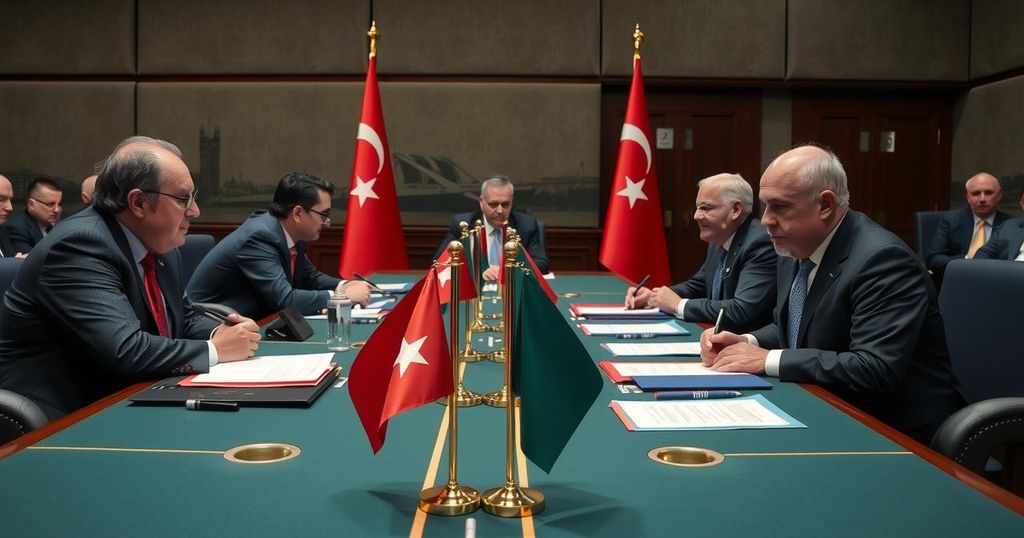Iran Nuclear Talks in Geneva with European Powers Before Trump’s Inauguration

Iran engaged in secretive nuclear talks with Germany, France, and the UK in Geneva, addressing sanctions and regional issues ahead of Trump’s presidency. Despite the German foreign ministry stating the talks are merely consultations, Iranian officials characterized the discussions as serious and constructive, emphasizing the goal of lifting sanctions. The backdrop includes rising concerns over Iran’s nuclear advancements and the potential reimposition of sanctions by European powers as tensions escalate. The outcome of these talks is critical amid the return of Trump, known for his tough stance on Iran.
On Monday, Iran commenced two days of discussions in Geneva with Germany, France, and the United Kingdom regarding its nuclear program, just one week before the inauguration of Donald Trump as the President of the United States. These discreet talks follow previous negotiations held less than two months ago in the same city, reflecting the West’s growing concern over Iran’s nuclear advancements. Despite the secretive nature of these discussions, Iranian Deputy Foreign Minister Majid Takht-Ravanchi acknowledged meetings with his European counterparts, addressing mutual interests including sanctions lifting and regional tensions.
Kazem Gharibabadi, Iran’s Deputy Foreign Minister for International Affairs, characterized the negotiations as “serious, frank and constructive,” indicating progress on agreements related to sanctions and nuclear details that could lead to a resolution. Although the consultations were described by the German foreign ministry as non-negotiatory, Iranian officials emphasized their intent to engage in comprehensive dialogue to achieve a sustainable agreement.
The talks aim to address a breadth of topics, with the primary focus from Tehran being the removal of sanctions. The French foreign ministry underscored the importance of these discussions as a continued effort to find a diplomatic resolution concerning Iran’s nuclear program, which remains a critical issue of concern.
In December, Iran announced initiatives to enhance its nuclear capabilities by increasing its production of enriched uranium at the Fordo facility, raising alarm among European countries. France, Germany, and the UK formally expressed their deep worries over Iran’s nuclear escalation, hinting at potential reimposition of sanctions to mitigate nuclear proliferation risks.
As the situation evolves, President Emmanuel Macron has labeled Iran as the “main strategic and security challenge” for the Middle East, highlighting the urgency of regulating its nuclear activities. The upcoming return of Donald Trump, recognized for his stringent policies against Iran during his first term, adds another layer of complexity to these discussions, further complicating the potential for a diplomatic solution.
Overall, these remarkable talks in Geneva symbolize the continuous engagement between Iran and the E3 nations amidst rising tensions regarding nuclear proliferation, with a keen focus on securing a peaceful resolution.
The negotiations regarding Iran’s nuclear program have been a point of contention since the United States exited the Joint Comprehensive Plan of Action (JCPOA) in 2018 under President Trump. The JCPOA was designed to ensure that Iran’s nuclear program remained exclusively peaceful in exchange for sanctions relief. Since the U.S. withdrawal, Iran’s nuclear activities have expanded significantly, prompting concern among European powers and raising fears of nuclear weapons development. The recent secretive talks in Geneva are a reflective measure of efforts to mitigate the crisis and seek a diplomatic path forward before the reinstallation of Trump in office, who is known for his aggressive stance towards Iran.
The recent talks in Geneva underscore the complex dynamics surrounding Iran’s nuclear ambitions and the broader geopolitical implications involving European nations and the United States. With Iran asserting its right to nuclear power while the E3 countries push for diplomatic solutions, the outcome remains uncertain, especially with Trump’s return to the White House, which could radically shift the landscape of negotiations. Nonetheless, both sides appear committed to continuing discussions, aiming for a comprehensive resolution amidst intensifying scrutiny and pressure surrounding Iran’s nuclear program.
Original Source: www.swissinfo.ch








